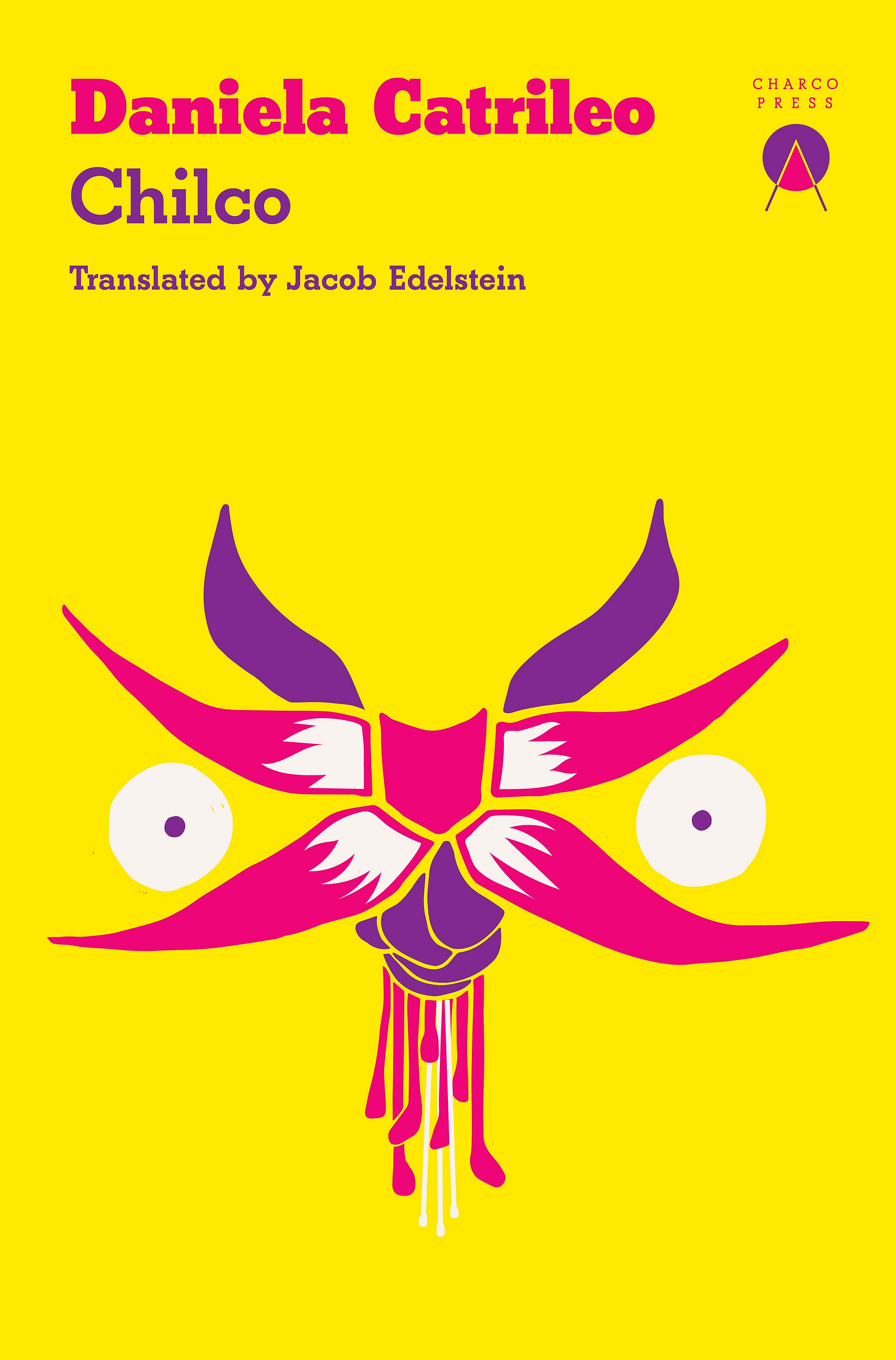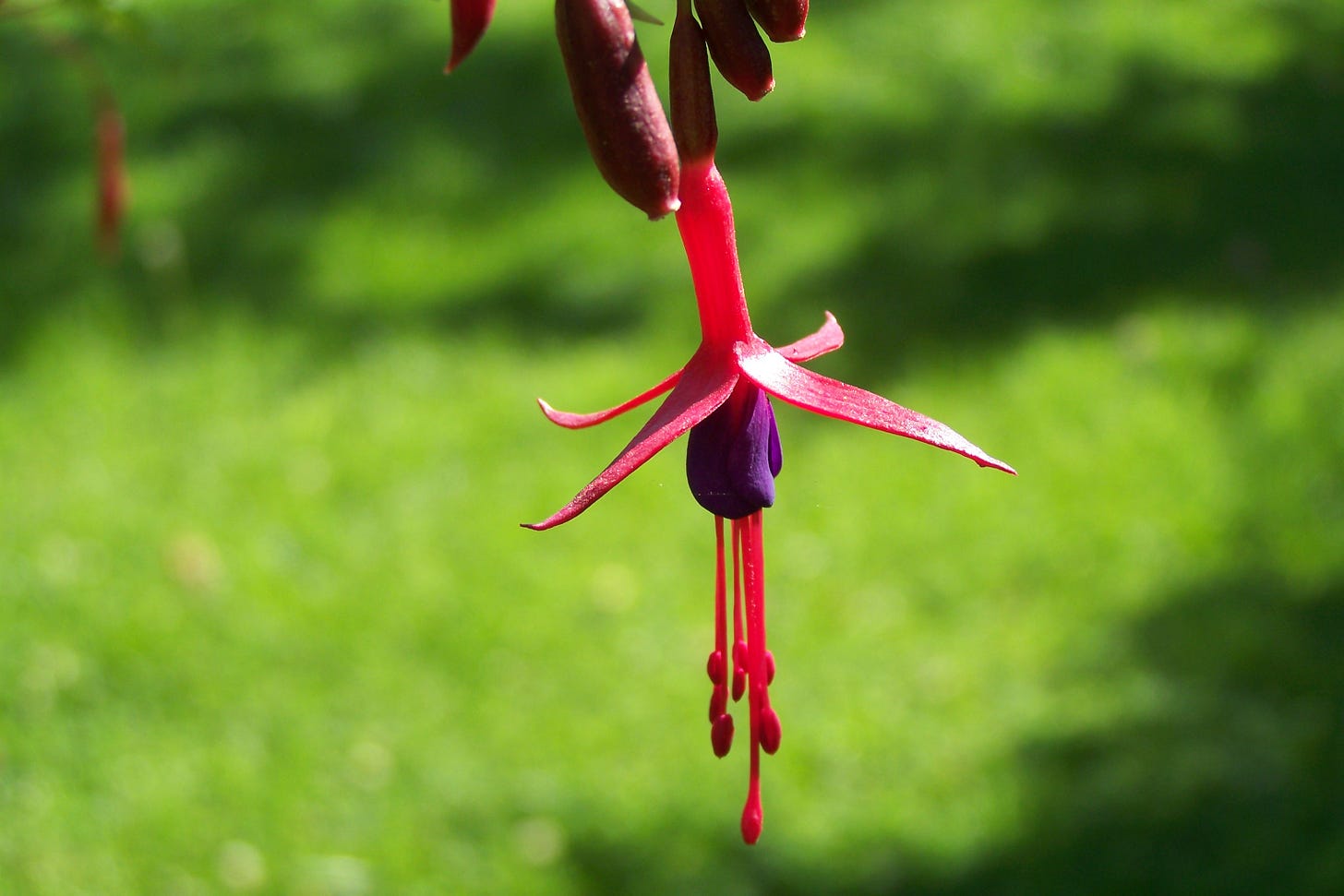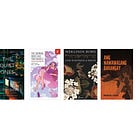Chilco by Daniela Catrileo
and translated by Jacob Goldstein
When I requested for an advance reader's copy of Chilco from Charco Press, I had mentioned that the summary at the back of the book seems to mirror that of my country, thus the request. By the end of the book, I decided it's not like my country but it shares so many things. I didn't know reading Chilco would be so much personal.
Chilco is about Mari and Pascale's flight from Capital City to Chilco, Pascale's home island. Chilco is a Mapudungan word for fuschia. It is also the name of a fuschia flower that grows wild in the island and is used for its various medicinal properties. There's a mysterious air surrounding Chilco, an underlying darkness that kept me on edge but is never truly explained. Capital City, on the other hand, is in the brink of environmental and economic collapse due to greed and capitalism by a large real estate corporation. Sinkholes appear in multiple locations, food is scarce, and the government doesn't help its people.
The book starts with Mari and Pascale's first few days back in Chilco. Mari senses a air of decay and putrefication all over Chilco that only she can smell. She asks Pascale and their neighbors if they can smell it but they don't. When Mari's family visit her in Chilco, they instantly commented how the place reeks of rot. This smell though was never really explained but I have my own theories.
I feel like there's a depth to Chilco that's inaccessible to me. I think it's because I am reading a translated work and I am not familiar with the culture or maybe because I am an outsider looking in. Is this what Mari was feeling? Not truly belonging to Chilco? Is this what the "smell" represented? That there's something unexplainable with the island and she doesn't truly get it because she's an outsider. Or maybe because this book starts at the end and that I have to read it again to make the story full circle.
The book's unusual narrative format and non-linear timeline is a bit off-putting but I don't think it takes away what Catrileo is trying to say, the ones that resonate with me at least. I read this with my friend
and although we had differing views on the narrative format, I had a really nice chat with her. Martha, if you're reading this, let me know if you still feel the same way.The breakdown of a movement
When buildings collapsed and sinkholes started appearing in Capital City, a protest movement was born against capitalists who exploit the land and its indigenous people. At first it felt like the movement was going to succeed - everybody was participating and angry and the camaraderie built against a common cause was infectious. But then reality starts to check in. There was no food, money, or jobs to be had. Little by little, the movement slowly started to disintegrate. Catrileo writes about how it slowly crept.
The social phenomenon of flight became evident in messages among family, friends, and colleagues. X, Soandso, DoñaWhatsHerName:
'Has left the group chat'
'Has exited the conversation'
'UserX has blocked you'
I never read anything like it. It was well articulated and the social media phenomenon aspect of it felt too real. I always read about the start of uprisings/movements but never about the downfall of it.
Yes, the movement was immense, but its righteousness never made it absolute.
Culture and identity
Both Capital City and Chilco are characters in their own right in the book. Capital City represented colonialism and capitalism while Chilco represented liberation, the only island in the country that’s never been colonized. However, when Mari and Pascale moved to Chilco they were never truly free. Most especially Pascale even though he was the one who wanted to move to Chilco the most. There's also a mysterious air going about Pascale's identity that's up for interpretation and doesn’t sit well with some of the island’s inhabitants.
As we read Mari thoughts, we read about her own internal struggles dealing with her ethnic roots, her grief over leaving Capital City for the life Pascale wants in Chilco, and her anxiety whether Pascale will be accepted by Chilco society. We also read how she grapples with belonging to Chilco.
Exploring my country's colonial past
Reading Chilco made me look into my country's own colonial past. Though the country where the book is set in is never named, we get a sense that it's Chile. Like Chile, the Philippines was ruled by the Spanish crown for 333 years. It got me thinking about my hometown. There's a big island in my hometown called Homonhon where Magellan first landed in the Philippines. Then, just a bridge away from my current city is the place where he was killed. These facts still baffle my little mind.
In Chilco, Catrileo explores how colonialism eroded indigenous memories, language, and culture. This made me wonder what the Philippines would look like if we haven't been colonized, if we would have been a unified archipelagic country at all. Islam would have been the more dominant religion. The name Philippines wouldn't have existed at all, having been named after King Philip II of Spain. Our cultural progress might have had a different trajectory. I wonder what customs would we be practicing today? Will my favorite food be still called adobo or named something less Spanish? Will I appreciate the architecture of our old cities if Spain have not imposed their architectural style here? Would have I asked a Roman Catholic priest to bless our new car last Saturday rather than ask somebody to slit the throat of a chicken and have its blood drip on the ground at the front of our car so that the spirits would always bless our travels?
However, if not Spain, some other country would have got us first. So many possibilities but what's done is done.
Unlike my hometown, Chilco was never colonized by Spain. The islanders fought her for their freedom. It's evident on how their culture is deeply embedded in their day-to-day lives. Some households still use items used by their long ago ancestors. Their radios are tuned to reports happening on the island and not on Capital City. Islanders are wary of foreigners. They put on a display of their everyday lives when you visit, but never really welcoming you.
Then I thought about the countries who were never colonized because they were the colonizers. What does it feel like?
Throughout the pages, Catrileo explores themes of colonialism, displacement, capitalism, and collective memory. These themes bleed in and out of the narrative like a fever dream, sometimes incoherent and unstructured. And like a fever dream, it left a strong impression.
Chilco by Daniela Catrileo is out in July 2025. Thank you so much Charco Press for the ARC!
In case you missed this..
Everything in this newsletter is free for now. And so, every open, like, comment, or restack means a lot to me and I thank you all for your support. If you’d like to further support me, buy me a coffee so that I can continue this work. Thanks again for reading and remember, folks, to read books out of the social media algorithm!






